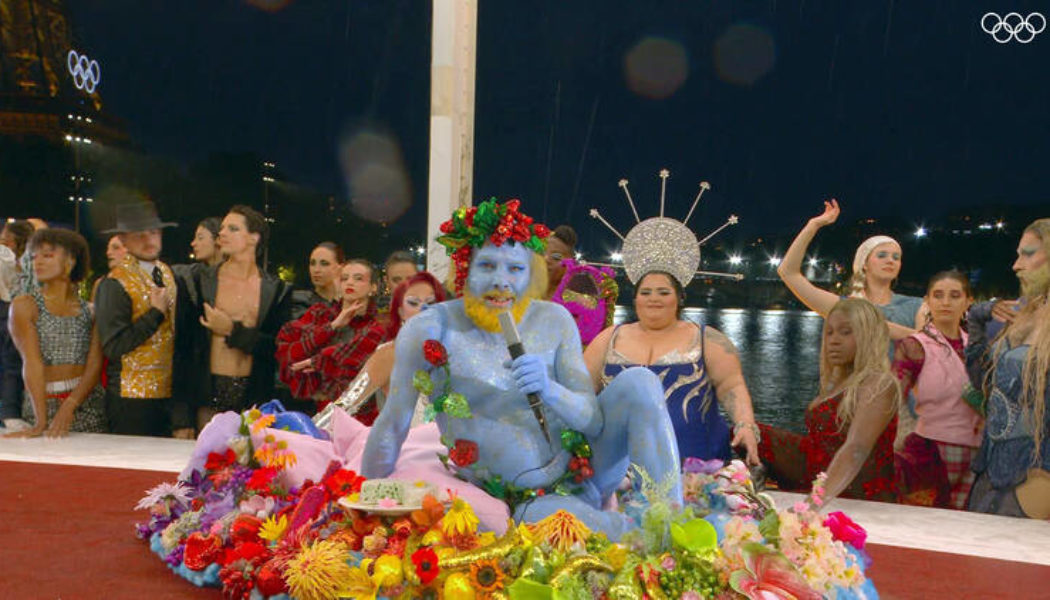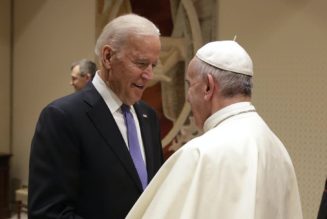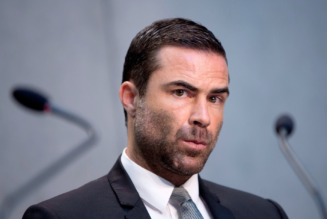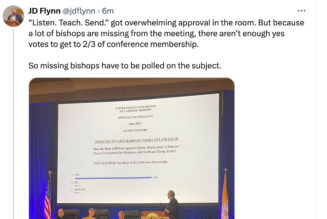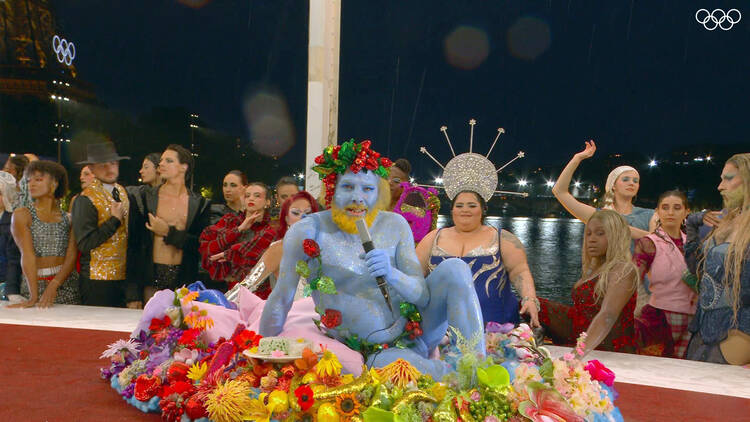
It’s déjà vu all over again. Or at least that’s the way the French Olympic controversy feels. Cultural elites mocking Christian symbols? In France? Sacrébleu! How did they come up with something so original? Drag queens? How transgressive! Only the flabby Smurf was new.
My first reaction to the silhouette of Da Vinci’s “The Last Supper” filled in with a tableau of bacchanalia was, I’ll admit, a yawn. It’s only been a few months since transgender activists used St. Patrick’s Cathedral as the backdrop for another vulgar show; the National Endowment for the Arts once funded a photo of a crucifix submerged in urine; I’ve seen Jesus depicted as a bare-chested woman named “Christa.” Yadda, yadda, yadda. Isn’t there a Marvel remake to watch instead? “The Fast and Furious 86”? Anything more creative?
This is not, however, another column tut-tutting at the Catholic League for taking the stale bait. Lighten up! Dialogue! Put it in context!
This is an admission that I ought to be more offended than I am.
In this case, history and context make the display more insidious than the tit-for-tat provocations of the American political scene. Faithful Christians today in France are a minority, a minority that has even experienced bloodshed. The French seminarians that I teach in Rome—among the most impressive national contingents—sometimes voice amazement to me at how freely Americans express religious ideas in public. When France’s President Emmanuel Macron ran into electoral trouble due to a high-handed governing style and policies that offended both right and left, he made a play for unity by pushing abortion and euthanasia.
The unborn and the elderly—and those Christians who defend them—were a soft target, not able to put up much of a fight. The display at the Olympics was not innocent fun gone too far or Europeans just being artsy—making boring movies with wan people staring into space. It was bullying a minority.
When it comes to religious liberty, France’s modern record is darker than most Americans realize. Americans know that we had a revolution that won us independence from Britain and that one of the results of that revolution was a constitution guaranteeing the free exercise of religion. We know that France had a revolution not long after. Our flags are the same colors, and we assume that the results must have been about the same.
Reading the great Soviet dissident Aleksandr Solzhenitsyn, however, helped me to appreciate the differences between the American War of Independence and the French Revolution. In contemporary terms, ours was not a “revolution” so much as a colonial independence movement. As the historian Nathaniel Philbrick writes, describing Boston’s patriots before Lexington and Concord, they “were not trying to reinvent the world as they then knew it; they were attempting to get back to the way it had been when they were free from imperial restraint.” The American colonists liked their way of life and were trying to preserve it from rule that had become, in their eyes, foreign and oppressive.
The French revolutionaries, on the other hand, were trying to destroy French society as they knew it and start over with something else. Bloodshed was in the revolution’s DNA. Whereas the American revolutionaries emphasized adherence to established legal principles—no taxation without representation, John Adams defending the Redcoats after the Boston Massacre—the first Bastille Day in France culminated with the extrajudicial beheading of the fortress’s commander. The Olympic opening ceremony this year in Paris also featured a beheaded Marie Antoinette. The choice struck me as a little odd, since, other than ISIS, regimes these days don’t much advertise their beheadings. But, hey, vive la révolution!
This is not to say that the American patriots were angels—as the loyalists could attest—but that the aims and self-understanding of the two “revolutions” were fundamentally at odds. Nowhere are the differences more glaring than when it comes to religious liberty. By and large, the American founding fathers—whatever their eclectic personal beliefs—saw religion as “a necessary spring of popular government,” as George Washington put it in his farewell address. American religious minorities, including Baptists and Catholics, supported the First Amendment precisely because they understood it to protect, not limit, the practice and expression of religion.
In France, by contrast, despite early support for moderate reforms among the clergy, the revolutionaries came to see Catholicism (rightly) as woven into the very fabric of French society—the society they aimed to destroy. As the Revolution proceeded from mob violence to organized terror, it assumed ever more grandiose—indeed, messianic—pretensions. As Alexis de Tocqueville observed decades later, the revolutionaries eventually saw themselves as ushering in the “regeneration of the whole human race.”
The American understanding of religious liberty sees religious expression—while remaining neutral on most details—as a good. It is concerned to protect religious minorities from state oppression, while the French revolutionary ethos eventually offered an alternative state religion and instituted an explicit program of “dechristianization.”
The period that followed was among the most intense and brutal persecutions in the church’s history. Worship and the celebration of the sacraments were forbidden and tens of thousands of Catholics killed. Bloody persecution recurred during the reign of the Paris Commune, and the archbishop of Paris was executed in 1871. Napoleon allowed Catholics to worship but made sure the church was subordinated to the state.
The French principle of laïcité, in fact, gives a fancy name to low-level religious discrimination, institutionalizing bias against religious expression. Blasphemy—such as we saw at the Olympic opening ceremony—is allowed, but public expressions of faith are intolerable. An equally ugly icon of this instinct to discriminate was the scene of four armed French police officers standing over a Muslim woman and forcing her to remove her clothing on a beach in Nice—all facilitated by an irrational antipathy to faith masquerading as constitutional principle.
One of the great ironies of the French Revolution has always been the way it was forced to ape the culture it sought to replace. The revolutionaries replaced the Gregorian calendar and made 1789 the new Year One. Revolutionary feast days (the Day of Genius!) replaced Christmas and Easter. Like adolescents in a role-playing game, the revolutionaries came up with new religions—like Theophilanthropy—to go with their new holidays. They even added a cult of relics, parading the bones of Voltaire into Paris in solemn procession to be entombed in a former church. Inventing a female figure to replace the Virgin Mary, they came up with…Marianne.
The revolutionaries, in other words, were forced to pirate the forms of a once-great Christian culture because they didn’t have enough cultural substance of their own for a truly creative endeavor.
The French, after all, have a lot to be proud of culturally—from Chartres Cathedral to Mont Saint-Michel, from Joan of Arc to Thérèse of Lisieux—but without Christianity, what’s left to celebrate is rather less impressive (Foucault—really?). Years ago, when visiting Paris—as beautiful as its reputation is—I remember going to the Eiffel Tower and, when I got up close, thinking, “It’s impressive from a distance, but up close it’s just a lot of steel girders and empty space.” What the organizers of the Paris Olympics put on display was their empty space—the vacuousness of the secular cultural project.
In the end, that vacuousness is what makes the mockery of Christianity at the Paris Olympics so dull. Even with all the resources at their disposal—mounds of corporate funds and French tax euros—all they could do was cannibalize Christian forms.
France didn’t put its best foot forward at the opening ceremony, and I’m especially sorry for my French Catholic friends. It’s particularly nasty to beat up on a cultural minority at an event like the Olympics, and France’s bishops are right to protest. But whatever happens, I suspect I will probably doze through the closing ceremony. Maybe they’ll use a guillotine to snuff out the Olympic flame.
